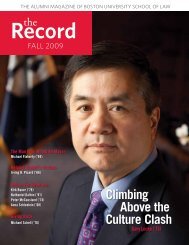the nature of representation: the cherokee right ... - Boston University
the nature of representation: the cherokee right ... - Boston University
the nature of representation: the cherokee right ... - Boston University
Create successful ePaper yourself
Turn your PDF publications into a flip-book with our unique Google optimized e-Paper software.
92 PUBLIC INTEREST LAW JOURNAL [Vol. 15<br />
infamous Trail <strong>of</strong> Tears. A cursory look at this period <strong>of</strong> American history<br />
suggests Indian removal was an inevitable result <strong>of</strong> manifest destiny; yet during <strong>the</strong><br />
period <strong>of</strong> time surrounding <strong>the</strong> Treaty <strong>of</strong> New Echota, awareness that a great wrong<br />
was being inflicted upon <strong>the</strong> Cherokees formed <strong>the</strong> backdrop to <strong>the</strong> treaty<br />
negotiations. The Cherokee national government, under <strong>the</strong> talented leadership <strong>of</strong><br />
John Ross, protested against removal, gaining sympa<strong>the</strong>tic allies both within <strong>the</strong><br />
U.S. government and <strong>the</strong> larger non-Cherokee population. However, this was also<br />
a contentious period regarding <strong>the</strong> leadership <strong>of</strong> <strong>the</strong> Cherokee people. An<br />
influential minority ultimately rebelled against Ross’s leadership and signed <strong>the</strong><br />
Treaty <strong>of</strong> New Echota on behalf <strong>of</strong> <strong>the</strong> Cherokee majority who did not share <strong>the</strong><br />
treaty-signers’ perspectives.<br />
Three factors created pressure for Cherokee land: a federal-Georgia compact to<br />
remove <strong>the</strong> Cherokees, <strong>the</strong> continual takings <strong>of</strong> reservation land by non-Indians,<br />
and <strong>the</strong> discovery <strong>of</strong> gold on Cherokee land. The resulting pressure defeated initial<br />
Cherokee unity in opposition to <strong>the</strong> concession <strong>of</strong> any more land. Factionalism,<br />
encouraged by <strong>the</strong> U.S. government, generated a lengthy history <strong>of</strong><br />
communications between <strong>the</strong> U.S. government and <strong>the</strong> competing Cherokee<br />
factions. But <strong>the</strong> lack <strong>of</strong> a single Cherokee party created maneuvering problems for<br />
<strong>the</strong> Cherokee factions and arguably contributed to <strong>the</strong> general Cherokee silence on<br />
<strong>the</strong> particulars <strong>of</strong> <strong>the</strong> delegate provision.<br />
Presented <strong>of</strong>ficially by <strong>the</strong> administration <strong>of</strong> President Andrew Jackson as<br />
bringing with <strong>the</strong>m liberal terms for <strong>the</strong> Cherokees, <strong>the</strong> U.S. negotiators for <strong>the</strong><br />
Treaty <strong>of</strong> New Echota bypassed <strong>the</strong> elected Cherokee leadership. They convened<br />
with <strong>the</strong> ‘democratically’ assembled Cherokee people, primarily consisting <strong>of</strong> <strong>the</strong><br />
minority in favor <strong>of</strong> removal. In response to criticism that <strong>the</strong> Treaty should not be<br />
imposed, Cherokee leaders were accused <strong>of</strong> greed and <strong>of</strong> not being truly Indian,<br />
while <strong>the</strong> general Cherokee resistance to removal was chalked up to a misguided<br />
adherence to <strong>the</strong>ir leaders’ bad advice. The controversies regarding <strong>the</strong> Treaty,<br />
however, must be set against <strong>the</strong> U.S. government’s <strong>of</strong>t-repeated assertion that <strong>the</strong><br />
Treaty was ‘unalterable’ and against <strong>the</strong> continuing reliance upon <strong>the</strong> Treaty to<br />
justify removal. The <strong>right</strong> guaranteed in Article 7 has not been abrogated or<br />
altered, and is arguably a still-existing treaty <strong>right</strong>. 2<br />
2 Following <strong>the</strong> Treaty <strong>of</strong> New Echota, <strong>the</strong> Cherokees and <strong>the</strong> U.S. government<br />
entered into additional treaties on Aug. 6, 1846, July 19, 1866, and Apr. 27, 1868, that<br />
remain valid. Treaty with <strong>the</strong> Cherokee, U.S.-Cherokee, Aug. 6, 1846, 9 Stat. 871; Treaty<br />
with <strong>the</strong> Cherokee, U.S.-Cherokee, July 19, 1866, 14 Stat. 799; Treaty with <strong>the</strong><br />
Cherokee, U.S.-Cherokee, Apr. 27, 1868, 16 Stat. 727; see 1 VINE DELORIA, JR. &<br />
RAYMOND J. DEMALLIE, DOCUMENTS OF AMERICAN INDIAN DIPLOMACY: TREATIES,<br />
AGREEMENTS, AND CONVENTIONS, 1775-1979, at 192-201 (1999); Jack Blair, Demanding<br />
a voice in our own best interest: a call for a delegate <strong>of</strong> <strong>the</strong> Cherokee Nation to <strong>the</strong><br />
United States House <strong>of</strong> Representatives, 20 AM. INDIAN L. REV. 225, 229 (1996)<br />
(detailing <strong>the</strong> arguments that <strong>the</strong> <strong>right</strong> still exists); CHARLES C. ROYCE, THE CHEROKEE<br />
NATION OF INDIANS 176-249 (1975) (overviewing each Cherokee treaty along with its<br />
relevant history).









